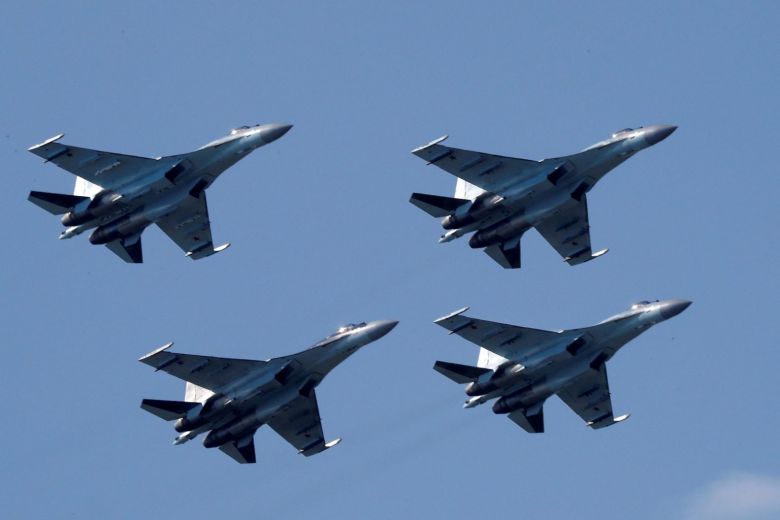
ABC News reports: "China said Friday it was 'outraged' over U.S. economic sanctions against a Chinese military agency and its director over the purchase of Russian fighter jets and surface-to-air missile equipment, and demanded the U.S. cancel the measure. Foreign Ministry spokesman Geng Shuang said Beijing has lodged stern complaints with Washington over the action, which triggers a ban on entering the U.S., forbids conducting transactions with the U.S. financial system and forces the blocking of all property and interests in property within U.S. jurisdiction. The sanctions were enacted 'to further impose costs on the Russian government in response to its malign activities,' Nauert said in the statement. The U.S. will continue to 'urge all countries to curtail relationships with Russia's defense and intelligence sectors, both of which are linked to malign activities worldwide,' she added."
- The Atlantic reports: "As the U.S.-China competition expands across multiple domains, there are even worries that trade tensions could, over the long term, make the prospect of a military confrontation between the two more likely. Which raises the urgent question: How does this end? It's perhaps simpler, and certainly more rhetorically arresting, to predict a new Cold War, resulting in a global economy split between two power centers. But the reality of where Washington and Beijing are most likely to arrive in the next decade is far more complex. The United States and China are forging a new, uncharted gray area—not quite the economic bifurcation that characterized the U.S.-Soviet relationship at the height of the Cold War, but far from the high degree of interdependence seen in the early-21st century."
- The Wall Street Journal reports: "China has placed under investigation the head of its national energy-planning agency—and the most prominent ethnic Uighur in the government—as part of a campaign against graft and other official misdeeds (...) Mr. Bekri is the latest in a string of senior energy regulators snared by President Xi Jinping's far-reaching anticorruption drive, launched in late 2012 to root out rampant graft, which has since expanded to target incompetence and negligence. Prosecutors said Thursday that they filed corruption charges against a former deputy to Mr. Bekri at the energy administration. Official statements don't say if cases are related."
- 2018-09-20 Trump Has Put the U.S. and China on the Cusp of a New Cold War
- 2018-09-19 Trump’s trade war still doesn’t scare China
- 2018-09-18 China's military and economic power 'cannot be denied' and US 'has to make room'
- 2018-09-17 China warns it won’t just play defense in a trade war with the US
- 2018-09-16 A Roadmap for the Great US-China Divorce
- 2018-09-14 U.S. Automakers Are Taking Hits From Both Sides in Trump's Trade War With China
- 2018-09-13 China welcomes US offer of talks as tariffs loom on $200 billion of goods
- 2018-09-12 United States 'deeply troubled' by alleged Chinese crackdown in Xinjiang
- 2018-09-11 China does away with family planning offices
- 2018-09-10 China vows to retaliate if the US takes any new steps on trade
- ABC News China 'outraged' by US sanctions over Russian weapons buy
- The Atlantic China and America May Be Forging a New Economic Order
- Wall Street Journal China's Antigraft Campaign Ensnares Top Energy Official, ex-Xinjiang Governor
- The New York Times Let's Talk About China
- CNN China's bullet trains are coming to Hong Kong: Here's what travelers can expect
- Forbes China Could Spoil Sri Lanka's Chance To Become A Breakout Nation Again
- Fox News China distances children from families to subdue Muslim west
- Financial Times China to weed out foreign content from schoolbooks
- Voice Of America Chinese Entrepreneur Rescinds Offer to Create 1 Million US Jobs
- MarketWatch Dow, S&P 500 records belie festering fear that China and the U.S. 'are on a collision course'
- Bloomberg Google Could Pay Dearly for Catering to China
- Financial Times US growth is shrugging off Donald Trump's China tariffs
- Washington Post China's interference in U.S. politics is just beginning
- Council on Foreign Relations China Pledges $60 Billion in Financing to an Increasingly Debt-Distressed Africa
- The New York Times Making Tariffs Corrupt Again
- Financial Times Opinion today: What China should do next
- Bloomberg The Future Is in Africa, and China Knows It
